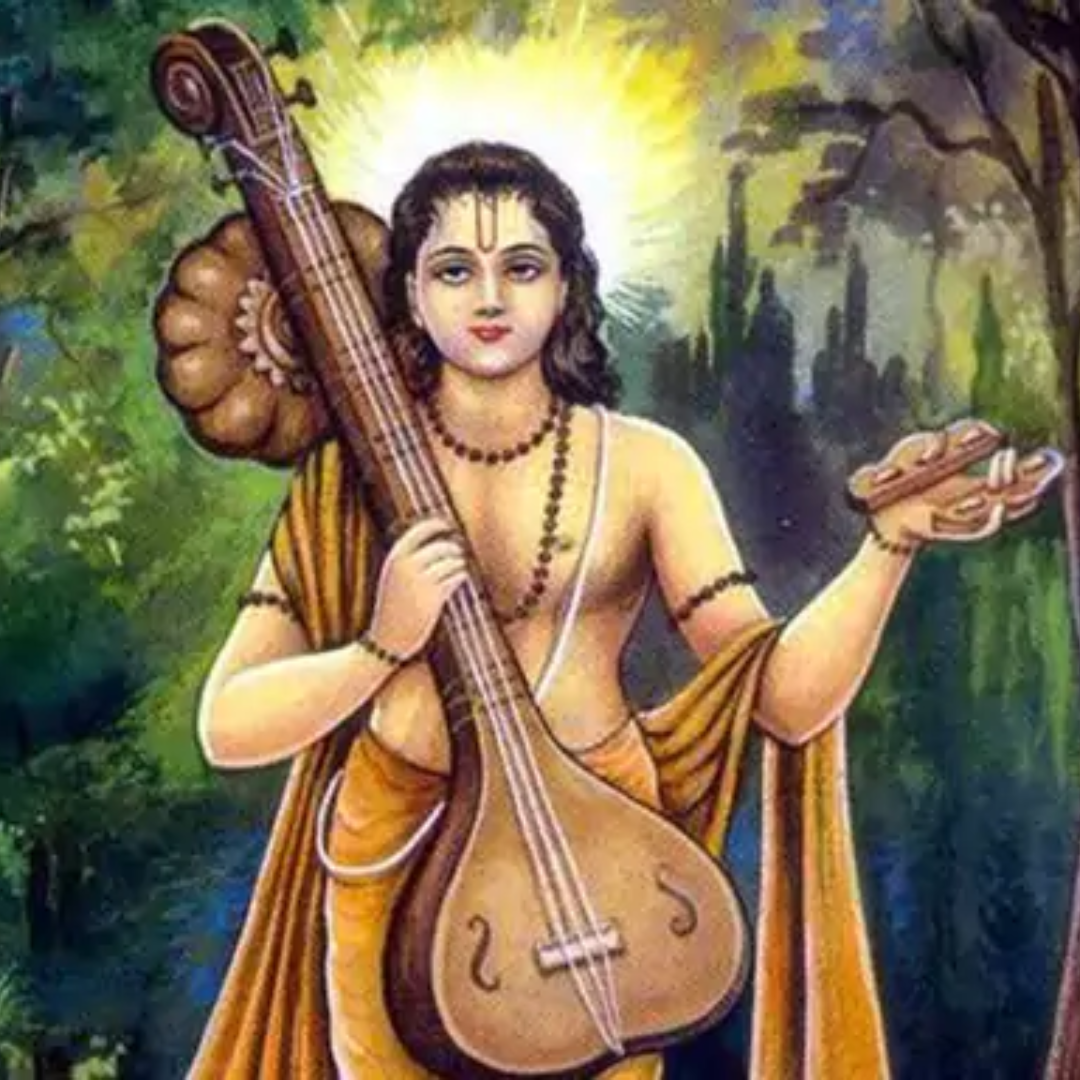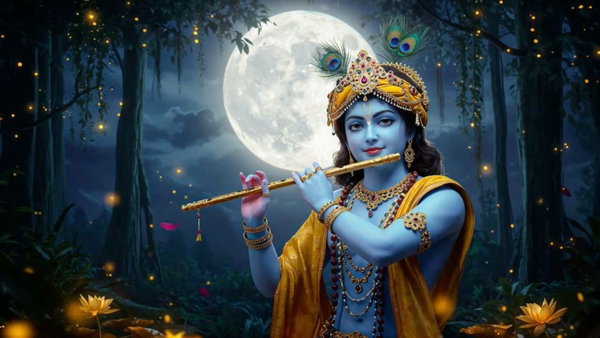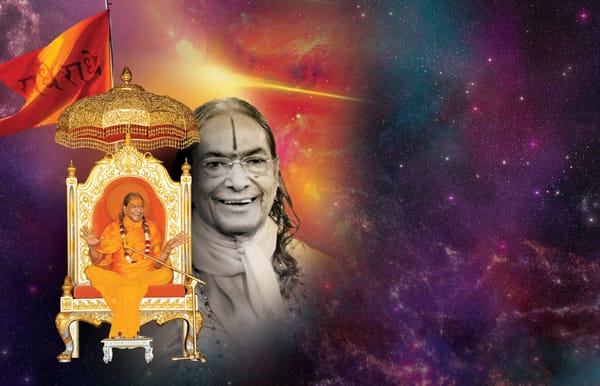Daily Devotion - Sep 8, 2025 (English)- Narad Bhakti Darshan - Part 2

Nārad Bhakti Darshan (continued) -
2) Amr̥to bhavati - Becomes amr̥t. Amr̥t has two meanings -
- It is eternal. Gyānis experience the bliss of Brahm without the senses, mind, and intellect. But devotee's senses, mind, and intellect also remain, and they are eternal and experience supreme bliss for eternity - Sadā 'paśyanti' sūrayaḥ. Such is the miracle of Bhakti that it allows the devotee to see God, hear His voice, smell His fragrance, and experience His touch. Unlike the gyāni, a devotee receives the benefit of God even through the senses, mind, and intellect. This Bhakti allows one to experience the nectar of divine love through every pore of one's being. Therefore, one who attains this becomes Amr̥t - Amr̥to bhavati.
- The second meaning of amṛt is moksh, meaning he becomes liberated. The devotee does not ask for liberation, but liberation happens automatically, without being asked.
Nāsmākaṁ kṣaṇamātramapyavasara: kr̥ṣṇārcanaṁ kurvatām।
muktirdvāri caturvidhāpi kimiyaṁ dāsyāyalolāyate॥
All forms of muktis stand with folded hands before the devotee, pleading to be accepted into service.
Dūre tiṣṭhamanāganāgasi kathaṁ kuryādanāryaṁ mayi
tvad gandhān nija nāma candana rasā lepasya lopo bhavet
First, the devotee scolds kaivalya-mukti (liberation attained by merging into Brahm) and says, "Stay far away! If I accept your service, the dualistic nectar of devotion will be destroyed. Do not enter this domain!”
Then, when the four types of dualistic liberation (sārṣṭi, sāmīpya, sārūpya, sālokya) come to serve the devotee, he rejects them as well - "If I accept your service, my pure love will be tainted with desire." If a devotee desires anything from the beloved, then that love will become impure - the spotless cloth of love will be stained with desire.
Even if the devotee must go to hell or be born in any species, if Bhakti remains, he joyfully accepts it -
Kāmaṁ bhava: svavr̥jinairnirayeṣu na: stācceto'livadyadi nu te padayo rameta।
But God says, Māmeva ye prapadyante māyāmetāṁ taranti te - "When you have accepted this law, then I must liberate you from Maya, whether you assume a body or not." The devotee may enjoy the nectar of devotion in a māyic body, or dwell eternally in Golok with a divine body. There is no difference - the difference is only in external appearance. Even as a crow, Kāgbhushundi relishes the same bliss as Nārad, Shukadev, and other saints. Therefore, God is bound to grant liberation to a surrendered soul. Gyānis, yogis, karmis - all attain liberation only through surrender. Without surrender to Shri Krishna -
- No karmī is freed from karma.
- No yogī is liberated.
- No gyānī can attain liberation.
All the siddhis are attained by performing austerities. The more they are used, the more they diminish - and ultimately they will come to an end. But God Himself becomes the siddhi of the devotee and grants liberation unasked.
- Tr̥pto bhavati - He becomes satisfied.
Even gyānis say -
Dhanyo'haṁ kr̥takr̥tyo'haṁ tr̥pto'haṁ śuddho'haṁ buddho'haṁ vimukto'ham।
What is the difference between the satisfaction of a gyānī and that of a devotee?
The gyānī's satisfaction is constant - it is shānta-rasa, the tranquil bliss of formless Brahm. It is not worldly pleasure, but a state that does not change.
The devotee's satisfaction, however, is of a different kind - it is marked by ever-increasing thirst. There is a cycle of satisfaction followed by thirst. It is not a satisfaction that stops.
This means -
- First, there is satisfaction, but beyond it
- There is also thirst.
Thus, Kishori Ji's form is described as -
Pyārī jū ko rūpa māno pyāsa hī ko rūpa hai। - Kishori Ji is the embodiment of divine thirst. So -
Pratikṣaṇa vardhamānam (Sutra 54)
Nārad Ji has defined love ahead. This love keeps increasing every moment. If satisfaction were complete, love would stop growing. But that stage never comes.
Love grows like the moon - always waxing, yet "pai yā meṁ pūrṇo nahiṁ" - it never becomes a full moon. So the devotee's tṛpti (satisfaction) is accompanied by thirst.
So -
Bhakti, whose internal form is Amr̥tasvarūpā (nectar-like) and external form is parama-prem-rūpā (supreme love)-
he who attains the perfect bhakti characterized by these two aspects becomes siddh, amr̥t, and tr̥pt.
In the fourth sutra, yallabdhvā pumān siddho bhavati, amṛto bhavati, tṛpto bhavati, Nārad Ji explained what happens upon attaining Bhakti.
Now, in the next sutra, he explains what does not happen upon attaining Bhakti.
Sutra 5 - Yatprāpya na kiñcid vāñchati na śocati, na dveṣṭi, na ramate, notsāhī bhavati।
Yatprāpya - upon attaining Bhakti, these five things do not occur:
i) na kiñcid vāñchati,
ii) na śocati,
iii) na dveṣṭi,
iv) na ramate,
v) notsāhī bhavati
What are these?
i) Yatprāpya na kiñcid vāñchati
One who has attained Bhakti has no desires remaining - he does not want "anything" at all.
What does "anything" mean? It means he does not desire anything other than Bhakti.
There are only three entities - one is maya, one is God, and one is the individual soul who desires. So within "anything," there are two areas -
- desires of the material realm and
- desires of the divine realm.
This means there should be no desires in the material realm and no desires in the divine realm. This is what constitutes na kiñcid vāñchati.
Some people ask, "How could Nārad Ji say this? Aren't there sakām bhaktas - the devotees with desires?"
Caturvidhābhajante māṁ janā: sukṛtino'rjuna।
Ārto jijñāsurarthārthī jñānī ca bharatarṣabha॥
Not only Nārad Ji, but every scripture and every saint says the same thing - upāsate puruṣaṁ ye hyakāmā:, yadā sarve pramucyante kāmā ye'sya hṛdiśritā:, jahāṁ rāma nahiṁ kāma tahaṁ aura jahāṁ kāma nahiṁ rāma and so on.
Gaurānga Mahāprabhu says - kāma andhatama prema nirmala bhāskara।
The difference between desire and love is as vast as the difference between darkness and light.
So everyone speaks of renouncing desires. Then what happens to the sakām bhakt - a devotee with desires?
To understand this -
- First, consider the desires of the material realm.
There are two types of desires -
i) Desire for inert objects (such as a mansion, a car, or a desire to eat sweets every day).
ii) Desire for conscious beings - mother, father, son, wife, husband, friends.
There cannot be a third type of desire because there are only two categories in the world - animate-inanimate, conscious-unconscious, movable-immovable.
So what happens when you form a desire?
When you desire any object or person, your mind naturally gravitates toward that object or person - and you do not even realize it. You had a mind, and you sent the poor thing away by creating a desire. This means the mind was not in God - which means your Bhakti ended.
You might say that it went only for a second. Then your Bhakti ended for that one second.
And when that desire forms, further contemplation and reflection will follow, and then efforts will be made to fulfill it. During those efforts, too, the contemplation will continue. Until that object is obtained, the mind will remain engaged with it. When the object is attained, even while enjoying it, the mind will remain engaged with it. You do not have ten or twenty minds. You have only one mind - you can either send it off to some object or person by forming a desire, or you can keep it engaged in your beloved Shri Krishna.
These two contradictory things cannot happen simultaneously.
So, making worldly desires means that you are worshipping whoever you desire, because your mind went there. A desire arises only when there is attachment - so it is clear there is attachment there.
Now, when the mind is attached to it, you must detach from it and attach to God. But instead of doing that, you engaged your mind in that desire and that object or person. So the mind went to the impure area. This cloth-like mind was already dirty. You dipped it in more filth and say, "I am sakām bhakt." This is not Bhakti to God at all.
For example, if someone's son is seriously ill, he goes to the doctor very late at night and requests his help earnestly. But his attachment is not to the doctor, nor in his various actions, such as calling the doctor, buying the medicine, and administering it. His attachment is to his own son. Where there is desire, there is attachment. This is why worldly desires must be completely abandoned. Those who consider God as the means for their gains or benefit will also consider Him the cause when there is loss. Then, when loss occurs, they also reject God and abuse Him, saying, "God killed our child. The neighbor had seven children, and an eighth was on the way. We had only one, and he died. What kind of God is this? You keep saying God, God - but there is injustice in His court, there is unfairness."
Desires are primarily of five types. These are the desires of the sense organs - sound for the ears, form for the eyes, smell for the nose, taste for the tongue, and touch for the skin. So if these five desires are worldly, then there is attachment to the world. So, the mind becomes even more impure, and this cannot be called Bhakti at all. It will be called devotion to the world.
Yo vṛṇīte manograāhya - one who creates desire for 'manograāhya', meaning the objects of the material world, is 'kumanīṣyasau' - utterly condemnable.
- Now let us take desires of the divine realm - this is truly the sakām bhakt, the devotee with desires that belong to the divine realm. Such a devotee is praiseworthy.
If the five desires mentioned above become related to Shri Krishna - the desire to see Him, the desire to hear His words, the desire to receive His touch - one who desires thus is a sakām bhakt, but this devotee with desires is not condemnable but supremely venerable. This is why Shukadev Paramahams praised Kubjā. She desired Shri Krishna as her husband, and attained Him too, but this desire is not condemnable.
Why? Because -
Durārādhyaṁ samārādhya viṣṇuṁ sarveśvareśvaram।
Yo vṛṇīte manograāhyamasattvāt kumanīṣyasau॥
She made God her subject. And God, being supremely pure, who purifies even the impure, purified her mind.
This was precisely Parikshit's doubt when Shukadev Paramahams said -
Tamevaparmātmānaṁ jārabuddhyāpisaṅgatā:
The Gopis loved Shri Krishna with the sentiment of a paramour, so Parikshit was startled. He said -
Kṛṣṇaṁ vidu: paraṁ kāntaṁ na tu bramhatayā mune।
Guṇapravāhoparamastāsāṁ guṇadhiyāṁ katham॥
The love of the Gopis, Kubja, and others was endowed with the three material gunas. This desire is for the love between wife and husband. So, how did those who loved Shri Krishna with such desire transcend desires? How did they transcend the qualities of maya?
Shukadev Paramahams replied -
Kāmaṁ krodhaṁ bhayaṁ snehamaiyāṁ sauhṛdameva ca।
Nityaṁ harau vidadhato yānti tanmayatāṁ hi te॥
Whether with the sentiment of desire, anger, jealousy, hatred, or any sentiment, the mind should have attachment to God - and that attachment should be one hundred percent. Then one becomes absorbed in Him, becomes completely engaged in God.
This is a natural, universal law - whoever you love, you become like them. If you love a tamasic being, you attain tamas. If you love a rajasic being, you attain rajas.
And the way of loving is the same -
Kriyā sarvāpi saivātra paraṁ kāmo na vidyate। (Vallabhacharya)
Meaning, the way you love someone in the world is one hundred percent the same in the divine realm as well. Saints do not have any extra senses. They have the same senses, the same mind, the same intellect. Whatever you do in the world with your senses, mind, and intellect, they also do the same in the divine realm. What more can they do than this, anyway?
TO BE CONTINUED...
Recommended books by Jagadguru Shri Kripalu Ji Maharaj related to this topic:





